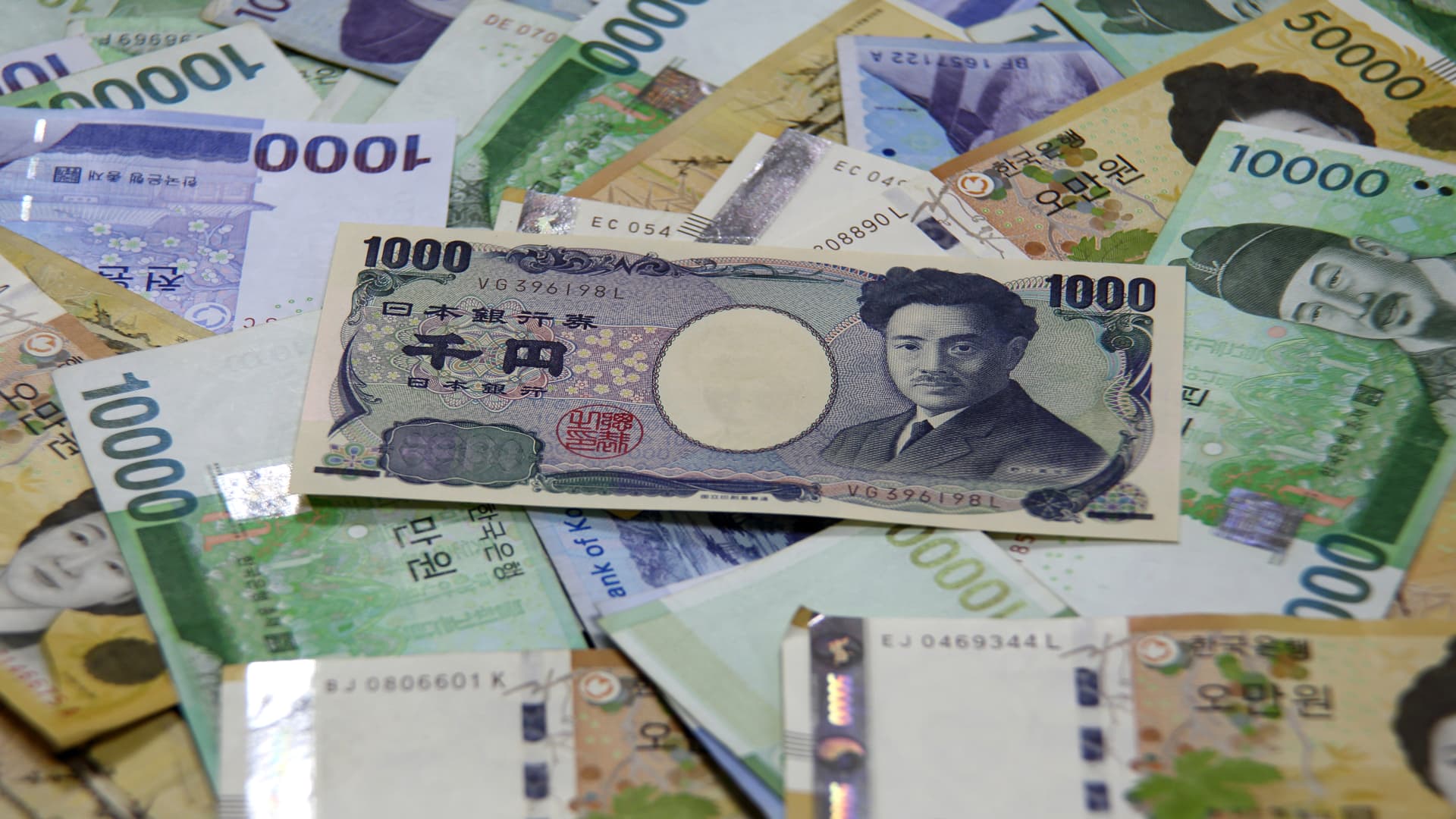A Japanese 1,000 yen banknote sits on a pile of South Korean won banknotes for an arranged photograph at a Woori Bank Co. branch in Seoul, South Korea.
SeongJoon Cho | Bloomberg via Getty Images
Bank of America is bearish on a slew of Asian currencies and neutral at best on others, as the investment bank says it is the start of a “chaotic era.”
“We are not bullish on any currency in Asia,” Bank of America said in a recent report, with many currencies impacted by a delayed Federal Reserve easing cycle and sustained strength in the U.S. dollar.
The investment bank singled out the Chinese yuan, South Korean won, Taiwan dollar, Thai baht and Vietnamese dong under its bearish category.
Among their “neutral” list of currencies are the Hong Kong dollar, the Indonesian rupiah, the India rupee, the Malaysian ringgit, the Philippine peso and the Singapore dollar.
Chinese yuan
BofA forecasts the Chinese yuan to trade at 7.35 against the dollar this quarter and weaken to 7.45 in the third and fourth quarters.
The bank expects yuan depreciation pressures to sustain into the second half of the year, due to: the delayed Fed easing, China’s disinflationary behavior aggravating yield gap with the U.S. and a weak financial account as a result of a deterioration in foreign direct investment.

Chinese onshore yuan since the start of the year
Hotter-than-expected U.S. inflation in March pushed back market expectations of a rate cut to September, and lowered the outlook this year to two reductions from three.
The onshore CNY is currently trading at 7.24 per U.S. dollar.
South Korean won
The outlook for the Korean won “significantly turned” after the Fed pushed back on the timing of the rate cuts and Middle East geopolitical risks became a major headwind, said BofA.
“Year-to-date, we have seen impressive inflows into Korean equities, but these inflows are beginning to reverse as global equities are turning from the two aforementioned risk,” BofA’s economists wrote.
The South Korean won recently slipped to an 18-month low of 1,389.5 against the dollar. The Bank of Korea chief called the won volatility “excessive” and said the central bank would intervene if needed.
The won was last trading at 1,347.3 against the U.S. dollar. BofA’s economists said the won is currently overvalued compared with fair value of 1,417.
Taiwan dollar
BofA also remains negative on the Taiwan dollar given strong equity outflows and life insurance companies’ additional unwinding of non-deliverable forward hedges. An NDF is a currency derivatives contract that establishes a settlement between the prevailing spot rate and a contracted rate.
The Taiwan dollar is currently trading at 32.6 per U.S. dollar.
Vietnamese dong and Thai baht
The Vietnamese dong is trading at 25,450 per dollar, weakening almost 5% so far this year.
Compounding the impact of delayed Fed cuts are Vietnam’s political instability following the second presidential resignation in two years as well as difficulty in its property sector, said BofA. Those headwinds fuel domestic demand for the U.S. dollar and gold, the bank said.
“We revise our forecasts in anticipation of further modest VND depreciation pressure to 25,600 by end-2Q and ultimately USD/VND at 25,700 by year-end,” the note said.
The Thai baht similarly remains vulnerable to geopolitical tensions via higher oil prices and freight costs, BofA said. It revised its forecast for the currency to 37 against the greenback by the end of the year.
The investment bank did not mention the Japanese yen, which has hovered around 34-year lows against the U.S. dollar. The currency has struggled, slipping past 150, since the Bank of Japan raised rates in March.

